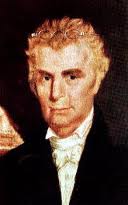Ex Church of Christ support groupHome * Website Purpose * History * UnBiblical Teachings
* Spiritual Abuse Jesus' View of God
* Faith & Works
* New Covenant
* The
Pattern * Romans 14
| ||
|
_____________________________________________
Alexander Campbell, the most famous mover and shaker in the Restoration
Movement, was born in Scotland and was a member of the Anti-Burgher Old Light
Presbyterian Church. Alexander's father, Thomas Campbell, had pushed for a united church with every believer in Jesus included*. To the Campbells this meant laying down all creeds, ecclesiastical hierarchy, and catechisms and just following the New Testament. (Actually Campbell believed the church is directed by the book of Acts and the epistles, with the gospels falling in the previous Moses era, an emphasis still to be found in many hard-line churches of Christ.) Alexander and his father were strongly influenced by theScottish School of Common Sense which traced its ancestry to Sir Francis Bacon (the scientific method) and John Locke. Alexander and his father were thrilled to be starting the first scientific church. Alexander Campbell was a progressive optimistic modernist who, in his early ministry, believed a scientific church would overcome all earthly governments. At the time that Alexander began writing his first magazine, The Christian Baptist, Massachusetts still had a state religion. It was not until 1833 that Massachusetts accepted the separation of church and state. So Alexander attacked any hierarchy and any organization that superceded the local congregation**. Barton W. Stone was yet another ex-Presbyterian preacher. Stone became famous and powerful during the Cane Ridge Revival (1801), an all out roll-in-the-sawdust frontier Pentecostal-like revival in Kentucky. (Hard-line Churches of Christ today follow Campbell in rejecting Pentecostalism and any form of emotionalism.) Stone emphasized a more mystical emotional relationship with God and saw the church as so holy that it stood outside of human government.
Barton W. Stone was pessimistic to Campbell's optimism. Barton W. Stone is credited with promoting the name Church of Christ for the groups he worked with. (Stone's otherworldliness is credited with racial integration up until the turn of the century when churches became richer and began to establish Christian colleges. These colleges banned the enrollment of African-Americans until the 1960s and 1970s.) Having been christened as infants, and only later as preachers immersed in water, neither Barton W. Stone nor Campbell ever said that un-immersed believers were lost. It was Barton W. Stone in the beginning that kicked up a great fuss when the more radically minded preachers reduced the gospel to immersion and the weekly Lord's Supper. Stone believed that the hard-line preaching of immersion would drive a wedge between believers, and tried to discourage preachers from preaching salvation by immersion (even though he believed immersion was biblical baptism, and that baptism was for the forgiveness of sins). Stone also hated debating, saying that it moved people away from Christ rather than closer. The Waldensians practiced believer's baptism as pouring as early as the 1100s in France, Switzerland and Italy. Believer's baptism as pouring was an attitude of the Anabaptists in Switzerland and Germany in the 1520s. Believer's baptism as immersion became a Reformation attitude of the Baptists in the early 1600s, culminating in the 1644 London Confession of Faith. In the 1630s a Mr. Chauncy preached in New England that immersion was the only acceptable baptism. Near the end of his life Barton Stone feared the Restoration Movement had been a waste, because, far from uniting all the denominations into one glorious praising loving body, they had merely created another warring division. Although Stone's and Campbell's two groups united officially in 1837 in Kentucky, Stone was always dismayed that Campbell taught that the miraculous gifts of the Holy Spirit had ceased with the apostles. Stone was raised on the teaching of a student from the Puritan Jonathan Edwards's First Great Awakening, also a time of great emotional fervor for God, and his primary energy for the Restoration Movement came from the Cane Ridge Revival, a time when people believed their bodies were being wholly taken over by miraculous manifestations of the Holy Spirit. Stone taught that we receive the indwelling of the Holy Spirit at baptism, a teaching that Campbell agreed with. Stone also was influenced by his Presbyterian upbringing and did not believe humanity was able to bring about revival or restoration without a move of God. Campbell, in contrast, was optimistic about human progress, especially since science was producing so many inventions so fast: e.g. the steam engine and the telegraph. Stone disagreed with his Presbyterian upbringing on the topic of the Trinity. Hard-line Churches of Christ today do not teach the Trinity. They teach that the Father, Son and Holy Spirit are three separate co-equal persons, united in love and purpose, and that they together make up one godhead. The indwelling gift of the Holy Spirit is still debated in hard-line churches of Christ today. Most teach that whether the Holy Spirit indwells us or not, the only way the Holy Spirit operates on us is through hearing or reading the Bible. Others teach that the indwelling of the Holy Spirit was only for the apostolic age and is not for today. Campbell's and Stone's beliefs were so different in many respects that it is amazing they got along at all. But there were enough similarities that they were both drawn to and repelled by each other. Both Campbell and Stone and all the 19th century Restoration Movement believed they were awaiting a thousand year reign of Christ shortly to come to pass. This belief continued until the early 1900s when it was hotly debated from 1917 until 1945, at which time the amillenial view won the vast majority: the church Jesus established 1900 years ago is the kingdom of God ruling for a figurative thousand year reign; when Christ comes back He will take us to our eternal home in heaven (not to live on earth for a thousand years). Campbell was much more optimistic than Stone, especially about the Scottish Enlightenment, and believed, with the aid of scientific logic brought to the New Testament, he was ushering in the great millenial rule of Christ, illustrated by the fact that his second journal was called The Millenial Harbinger. According to Hughes, Campbell actually started two movements: 1. a unity movement of all believers in Jesus, and 2. a sect that believed they were the first to restore the original ancient faith of the New Testament church. These two movements split from each other within a few decades of the origin of the movement, the wealthier northern, more ecumenical movement became the Disciples of Christ, and the poorer southern, more sectarian became the Church of Christ, later the Churches of Christ. Two organizations heavily influenced by the early Restoration Movement are the Mormons, who believed they were re-establishing the original Church of Christ, and the Christadelphians. The Restoration Movement in the early 1800s epitomized the European view of Americans as arrogant teenagers. And they could afford to be arrogant: they were on the frontier of the richest farmland in the world, more land than there were (white) people, under a government that gave them more rights and freedom than anywhere else on earth, and the Restoration Movement was the fastest growing church, sometimes a thousand converts a month. They were deliriously happy. In the early years Campbell opposed missionary societies and any organization larger than the local congregation that could take on power and become corrupt. These sentiments were echoed among some Baptist groups. This suspicion of hierarchical oversight is a trait of the Scottish and Irish settlers who survived persecution in the British isles. Campbell's preaching and writing changed in 1837 when he was called upon to debate a popular Roman Catholic bishop in Cincinnati, Ohio. Campbell defended traditional Protestantism: Luther, Zwingli, Calvin, and Knox, against Catholicism. Since Massachusetts no longer had a state religion, he did not feel the need to rail against that threat any longer. Instead, Hughes believes, he made the shift from sect (we are the only ones) to denomination (taking his respected place as a part of society). Campbell established Bethany College in 1840 and was elected to be the head of the American Missionary Society in 1849. 1840 is the watershed year that seemed to separate Campbell from the Church of Christ. The Church of Christ had been formed by Campbell's early writings to oppose anything that did not come out of a scientific approach to the New Testament as a blueprint for the local congregation.
|
*"The true Christian church, or house of God, is composed of all those in every place that do publicly acknowledge Jesus of Nazareth as the true Messiah, and the only Savior of men; and, building themselves upon the foundation of the apostles and prophets, associate under the constitution which he himself has granted and authorized in the New Testament, and are walking in his ordinances and commandments - and of none else." --Alexander Campbell
**"The Christian religion has been buried under the rubbish of human traditions for hundreds of years...it has never been, till recently, disinterred...Various efforts have been made, and considerable progress attended them; but since the Grand Apostasy was completed, till the present generation, the gospel of Jesus Christ has not been laid open to mankind in its original plainness, simplicity, and majesty." --Alexander Campbell
"There is not one voice heard in all the world outside of the boundaries of the present reformation, calling upon the people to return to the original gospel and order of things." --Alexander Campbell
For more on the Holy Spirit click here.
| |
 He
arrived in the United States in 1809, only 33 years after the nation was formed.
His horror of Europe's method of having an official state church for each nation
prompted him to be virulently anti-establishment when it came to religion. This
fit well in the independently minded America, who, like teenagers on a spree
with their family car, had just thrown off the English yoke and were itching to
prove their newfound power.
He
arrived in the United States in 1809, only 33 years after the nation was formed.
His horror of Europe's method of having an official state church for each nation
prompted him to be virulently anti-establishment when it came to religion. This
fit well in the independently minded America, who, like teenagers on a spree
with their family car, had just thrown off the English yoke and were itching to
prove their newfound power. Stone
advocated other-worldliness, not cooperating with or subjugating oneself to any
earthly government, including not
Stone
advocated other-worldliness, not cooperating with or subjugating oneself to any
earthly government, including not 
